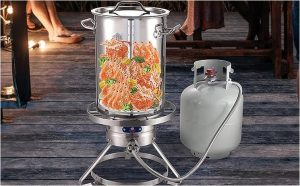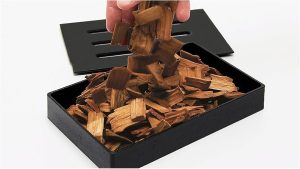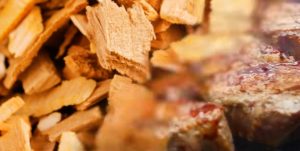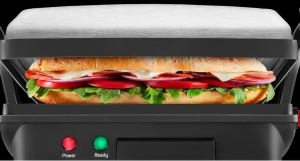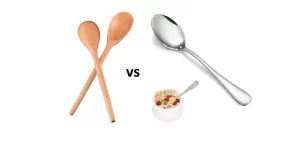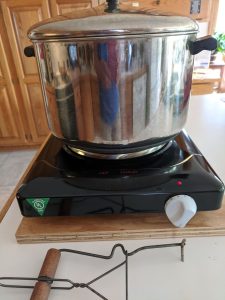5 Reasons Why Your Hot Plate Won’t Boil Water & Their Fixes
A hot plate may struggle to boil water due to various reasons such as insufficient power, incorrect setting, or a malfunctioning unit.
Hot plates are portable, electric-powered appliances designed for heating or cooking food and liquids. They are a convenient option for those with limited kitchen space or need an extra heating source. While hot plates are capable of boiling water, the time it takes can vary based on the power of the unit.
Generally, a hot plate with higher wattage will boil water faster. If your hot plate won’t boil water, it could be due to several reasons. Ensure that the hot plate is set to the highest setting. Some hot plates have multiple heat settings, and they may be set too low.
Check the power rating of your hot plate. A hot plate with a lower wattage will take longer to boil water compared to one with a higher wattage. And, there could be an issue with the hot plate itself. If it is not heating up at all or not reaching the desired temperature, it may be malfunctioning and require repair or replacement.
If you are wondering how to boil water on a hot plate, it is quite simple. Just place a pot of water on the hot plate, set it to the highest setting, and wait for the water to boil. The time it takes will depend on the power of your hot plate and the amount of water you are boiling.
Can You Boil Water on a Hot Plate?
Yes, you can boil water on a hot plate. A hot plate is designed to heat up the cookware and its contents, making it suitable for boiling water. However, the time it takes to boil water will depend on several factors including the wattage of the hot plate, the amount of water you are boiling, and the type of pot or pan you are using.
It is essential to use a pot or pan with a flat bottom to ensure even heat distribution. Also, make sure to cover the pot or pan with a lid to trap the heat and speed up the boiling process.
Be cautious not to overfill the pot or pan, as this can increase the boiling time and may cause the water to overflow.
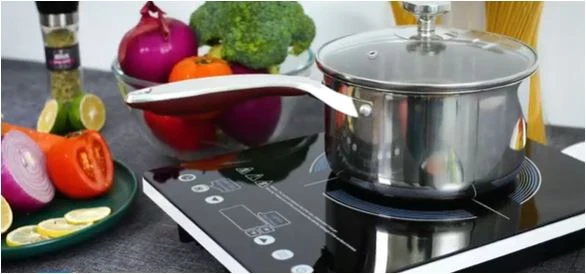
Common reasons why hot plates won’t boil water, and how to fix them
Experiencing trouble with your hot plate not boiling water can be frustrating, especially when you need a quick solution. Here are some common reasons why a hot plate may not be boiling water and some potential solutions.
1. Insufficient Power
The hot plate may not have enough power to boil water. This is common with low-wattage hot plates. A higher wattage hot plate will heat up faster and boil water quicker.
If you have a hot plate with adjustable power settings, make sure it is set to the highest setting. If the hot plate is still not boiling water, you may need to upgrade to a higher-wattage hot plate.
2. Faulty Thermostat
The thermostat controls the temperature of the hot plate. If the thermostat is faulty, the hot plate may not reach the boiling point of water.
You can test the thermostat by checking if the hot plate heats up at all or if it heats up but does not reach the boiling point. If the thermostat is faulty, it will need to be replaced.
3. Damaged Heating Element
The heating element is the part of the hot plate that heats up. If the heating element is damaged, the hot plate may not heat up at all, or it may not heat up enough to boil water
You can check the heating element by visually inspecting it for any visible damage or by using a multimeter to check for continuity. If the heating element is damaged, it will need to be replaced.
4. Incorrect Voltage Supply
Hot plates are designed to operate at a specific voltage. If the voltage supply is lower than the required voltage, the hot plate may not heat up enough to boil water.
Check the voltage rating of the hot plate and make sure it matches the voltage supply. If the voltage supply is lower than the required voltage, you will need to use a voltage converter.
5. Incorrect Pot or Pan
The type of pot or pan you use can also affect the boiling time. Make sure you are using a pot or pan that is suitable for your hot plate. Some hot plates work best with flat-bottomed pots and pans, while others may work better with round-bottomed ones.
Also, make sure the pot or pan is not too large for the hot plate. If the pot or pan is too large, the hot plate may not be able to heat it up evenly, and it may take longer to boil water.
Learn More: Hot Plate Dangers: Can a Hot Plate Cause a Fire
Will a 1000-watt Hot Plate Boil Water?
Yes, a 1000-watt hot plate will boil water. The wattage of a hot plate is directly related to how quickly it can heat up. A 1000-watt hot plate has a relatively high power output and should be able to boil water fairly quickly.
However, the exact time it will take to boil water will depend on other factors such as the amount of water you are boiling and the type of pot or pan you are using.
As a general guideline, it may take around 10-15 minutes to boil 1 liter of water on a 1000-watt hot plate. However, this is just an estimate and the actual time may vary.
Using Tips
Firstly, always use flat-bottomed cookware to ensure even heat distribution.
Secondly, do not overload the hot plate with too much weight as it may cause damage.
Thirdly, use a lid to cover the pot or pan to trap heat and speed up the cooking or boiling process.
Fourthly, always start with room temperature food or water to shorten the cooking or boiling time.
Fifth, ensure that the voltage supply matches the voltage requirement of the hot plate to avoid any damage or inefficiency.
You Might Also Like: 5 Best Crock-Pots
FAQs
Why is my hot plate taking a long time to boil water?
The boiling time on a hot plate can be affected by several factors such as the wattage of the hot plate, the amount of water you are boiling, and the type of pot or pan you are using. A low-wattage hot plate, a large amount of water, or a pot or pan with poor heat conductivity can all increase the boiling time.
Can I use any type of pot or pan on a hot plate?
It is recommended to use flat-bottomed cookware on a hot plate to ensure even heat distribution. Avoid using round-bottomed pots or pans as they may not heat up evenly.
Is it safe to leave a hot plate unattended while boiling water?
It is not recommended to leave any cooking appliance unattended while in use. Always monitor your hot plate while it is turned on to avoid any accidents or overheating.
Can I use a hot plate to boil water for cooking pasta or rice?
Yes, you can use a hot plate to boil water for cooking pasta or rice. Just make sure to use a pot or pan with a flat bottom and a lid to trap the heat and speed up the boiling process.
How can I speed up the boiling process on a hot plate?
To speed up the boiling process on a hot plate, use a pot or pan with a flat bottom and a lid, start with room temperature water, and make sure the hot plate is set to the highest temperature setting.
Why is my hot plate not boiling water at all?
If your hot plate is not boiling water at all, it may be due to a faulty thermostat, a damaged heating element, or an incorrect voltage supply. Check the thermostat, heating element, and voltage supply to ensure they are all functioning properly.
Can I boil water on a hot plate in a glass container?
It is not recommended to use a glass container on a hot plate as it may crack due to the rapid temperature change. Always use cookware that is suitable for use on a hot plate.
You Might Also Like: 7 Tips to Make Your Hot Plate Hotter
